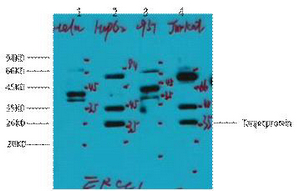ZAK (Phospho Ser165) rabbit pAb
- Catalog No.:YP1725
- Applications:WB
- Reactivity:Human;Mouse;Rat
- Target:
- MLTK
- Fields:
- >>MAPK signaling pathway
- Gene Name:
- MLTK ZAK HCCS4
- Protein Name:
- ZAK (Phospho-Ser165)
- Human Gene Id:
- 51776
- Human Swiss Prot No:
- Q9NYL2
- Mouse Gene Id:
- 65964
- Mouse Swiss Prot No:
- Q9ESL4
- Immunogen:
- Synthesized peptide derived from human ZAK (Phospho-Ser165)
- Specificity:
- This antibody detects endogenous levels of ZAK (Phospho-Ser165) at Human, Mouse,Rat
- Formulation:
- Liquid in PBS containing 50% glycerol, 0.5% BSA and 0.02% sodium azide.
- Source:
- Polyclonal, Rabbit,IgG
- Dilution:
- WB 1:500-2000
- Purification:
- The antibody was affinity-purified from rabbit serum by affinity-chromatography using specific immunogen.
- Concentration:
- 1 mg/ml
- Storage Stability:
- -15°C to -25°C/1 year(Do not lower than -25°C)
- Other Name:
- Mitogen-activated protein kinase kinase kinase MLT (EC 2.7.11.25) (Human cervical cancer suppressor gene 4 protein) (HCCS-4) (Leucine zipper- and sterile alpha motif-containing kinase) (MLK-like mitogen-activated protein triple kinase) (Mixed lineage kinase-related kinase) (MLK-related kinase) (MRK) (Sterile alpha motif- and leucine zipper-containing kinase AZK)
- Molecular Weight(Da):
- 88kD
- Background:
- This gene is a member of the MAPKKK family of signal transduction molecules and encodes a protein with an N-terminal kinase catalytic domain, followed by a leucine zipper motif and a sterile-alpha motif (SAM). This magnesium-binding protein forms homodimers and is located in the cytoplasm. The protein mediates gamma radiation signaling leading to cell cycle arrest and activity of this protein plays a role in cell cycle checkpoint regulation in cells. The protein also has pro-apoptotic activity. Alternate transcriptional splice variants, encoding different isoforms, have been characterized. [provided by RefSeq, Jul 2008],
- Function:
- catalytic activity:ATP + a protein = ADP + a phosphoprotein.,cofactor:Magnesium.,enzyme regulation:Activated by phosphorylation by PKN1 and autophosphorylation on Thr-161 and Ser-165.,function:Stress-activated component of a protein kinase signal transduction cascade. Regulates the JNK and p38 pathways. Pro-apoptotic. Role in regulation of S and G2 cell cycle checkpoint by direct phosphorylation of CHEK2. Isoform 1, but not isoform 2, causes cell shrinkage and disruption of actin stress fibers. Isoform 1 may have role in neoplastic cell transformation and cancer development. Isoform 1, but not isoform 2, phosphorylates histone H3 at 'Ser-28'.,similarity:Belongs to the protein kinase superfamily. STE Ser/Thr protein kinase family. MAP kinase kinase kinase subfamily.,similarity:Contains 1 protein kinase domain.,similarity:Contains 1 SAM (sterile alpha motif) domain.,subcellular location:Tr
- Subcellular Location:
- Cytoplasm . Nucleus . Translocates to the nucleus upon ultraviolet B irradiation. .
- Expression:
- Ubiquitously expressed. Isoform 2 is the predominant form in all tissues examined, except for liver, in which isoform 1 is more highly expressed.
- June 19-2018
- WESTERN IMMUNOBLOTTING PROTOCOL
- June 19-2018
- IMMUNOHISTOCHEMISTRY-PARAFFIN PROTOCOL
- June 19-2018
- IMMUNOFLUORESCENCE PROTOCOL
- September 08-2020
- FLOW-CYTOMEYRT-PROTOCOL
- May 20-2022
- Cell-Based ELISA│解您多样本WB检测之困扰
- July 13-2018
- CELL-BASED-ELISA-PROTOCOL-FOR-ACETYL-PROTEIN
- July 13-2018
- CELL-BASED-ELISA-PROTOCOL-FOR-PHOSPHO-PROTEIN
- July 13-2018
- Antibody-FAQs
- Products Images

- Western Blot analysis of HL-60 cell ,using primary antibody at 1:1000 dilution. Secondary antibody(catalog#:RS23920) was diluted at 1:10000



